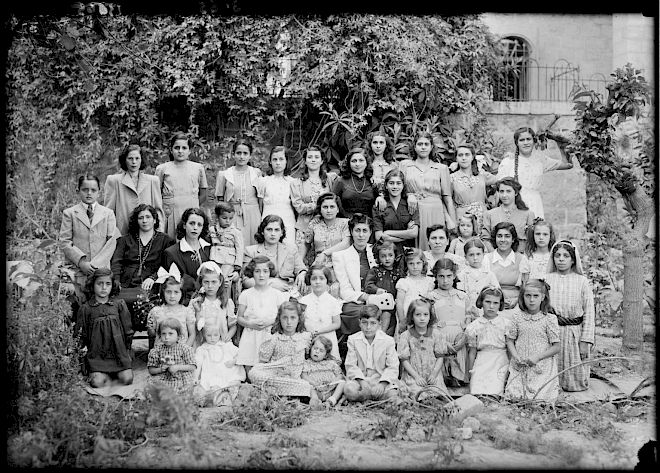What We're Reading This Week

“A girls’ school group affiliated with the Arab Ladies Union in the Musrara neighborhood of Jerusalem, Mandatory Palestine.” (Kaleem Hawa) Credit: Palestine Museum US via Jewish Currents
Mahdi Chowdhury, University of Cambridge
Kaleem Hawa, “The Nakba demands justice,” Jewish Currents
Published on the commemorative date of the Nakba—the Arabic term for “catastrophe” which refers to the forced displacement of over 750,000 Palestinians in 1948—the Palestinian writer, Kaleem Hawa, situates this history against comparative frameworks for justice and argues that the liberal “insistence on ‘reconciliation’ while Israel continues to ethnically cleanse the Palestinian people” is a capitulatory offer in place of actual justice and decolonization.
Esmat Elhalaby, “The world of Edward Said,” Boston Review
In the first major review of Timothy Brennan’s biography of Edward Said by a Palestinian historian, Esmat Elhalaby writes against the cliché of Said as someone more comfortable in “Burberry suits [than] keffiyehs” and reasserts the critical involvement of Said’s scholarship with the struggle for Palestinian freedom, the politics and literatures of the Arab world, and his tacit Third Worldism.
Vijay Prashad, Linda Tabar, and Chandni Desai, “Remembering histories of Third World internationalism between India and Palestine: An interview with Vijay Prashad,” Decolonization: Indigeneity, Education, and Society
This interview with Vijay Prashad offers a compelling synoptic history of the relationship between India and Palestine. From unanimous support between 1936 until the late 1980s for the Palestinian cause, to a phase of post-Soviet American-Israeli rapprochement under Congress, to the present moment in which Hindu nationalist politics have come to re-interpret and dominate India’s public discourse on Israel-Palestine.
Zaib un Nisa Aziz, Yale University
Saree Makdisi, “The Nakba is now,” The Nation
The recent wave of Israel's violence against Palestinian is not a new phenomenon but the latest manifestation of the racism embedded in Israeli institutions since the country’s inception, writes Saree Makdisi Professor of English and Comparative Literature at UCLA and author of forthcoming book Tolerance is a wasteland: Palestine and the culture of denial.
Tareq Baconi, “Sheikh Jarrah and after,” London Review of Books
The language of eviction and legal disputes employed by the Israeli Foreign Ministry seeks to obfuscate the Palestinian movement against occupation and forced dispossession. But the explosive events following the displacements in Sheikh Jarrah have shown clearly that Palestinians are a united people fighting against domination.
David Masciotra, "Dismantle All of This Stuff: A Conversation with Noam Chomsky," Los Angeles Review of Books
David Masciotra sits down Noam Chomsky to discuss his new book Consequences of capitalism: Manufacturing discontent and resistance (2020) (co-authored with Marv Waterstone, professor emeritus of geography at the University of Arizona) and to talk with him about our tumultuous times.
Tiger Zhifu Li, University of Sydney
Edith M Lederer, “Israel-Palestine conflict: Gaza ceasefire ‘not enough’ - Palestinian minister,” Stuff
Edith Lederer reports that Riyad Al-Malki, the Palestinians’ top diplomat, said a ceasefire in Gaza will enable 2 million Palestinians to sleep but it is “not enough at all” and the world must now tackle the difficult issues of Jerusalem’s future and achieving an independent Palestinian state.
Teresa Watanabe, “International students are in panic mode. Can they get back to U.S in time for fall term?” Los Angeles Times
Teresa Watanabe reports that international students are at a critical moment in their college education, panicked that huge backlogs for visas requests, shuttered consulates and bureaucratic rules that limit access to the U.S. may derail their long-awaited return to campus. The uncertainty has propelled higher education leaders across the country to plead to the Biden administration for faster action and more flexible rules for their international students, who bring not only their talent, but also highly coveted tuition revenue and billions of dollars to local economies.
Adam Pearse, “Blood supermoon: South Islanders in best place to witness lunar spectacle,” New Zealand Herald
Adam Pearse reports that last Wednesday, South Islanders on the east coast were in a prime position to have unobstructed views of the first visible “blood supermoon” in nearly 40 years in New Zealand. A “supermoon,” meanwhile, occurs when the Moon is at its closest point in its orbit around Earth—making it appear much larger than usual.
Matt Dworzańczyk, “This early 20th-Century copper mining town once provided comfort and community to hundreds of residents, but long after the frontier town was abandoned, a new generation moved in,” BBC
Matt Dworzańczyk reports that Kennecott, an early 20th-Century copper mining town, once provided comfort and community to hundreds of residents. Abandoned, reclaimed, and now preserved, Kennecott is the ghost town that helped electrify the US.